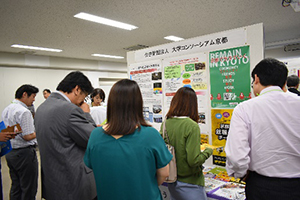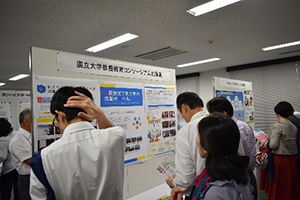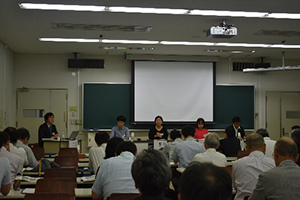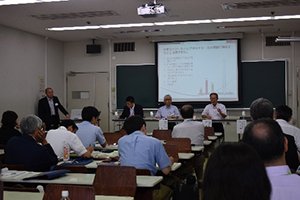Business Overview
In order to contribute to the development of higher education, we exchange information on the initiatives and research results of each university consortium.
Outline of the 16th National University Consortium Research Exchange Forum
- theme
- “Developing a University Together with a University Consortium”
- Purpose of the Tournament
- The various issues associated with the declining birthrate and aging population are so serious that they affect the foundation of Japan’s survival. In particular, the declining birthrate (the population of 18-year-olds, which peaked at 2.05 million in 1992 and remained stable at 1.2 million for the past 10 years, has declined again since 2018 and is expected to decline to 880,000 in 2040). This is a major problem for universities.
On the other hand, various reforms to education policy, which are related to the foundation of the country, from primary education to higher education, are being discussed, but it is unclear how permanent and effective they will be. In higher education in particular, there is a strong social demand for reform of university entrance examinations with an emphasis on the connection between high school and university, and for educational achievement targets and quality assurance, which should be the source of such reform.
Against this background, in this forum, I would like to examine the content of the discussions and the roles that the university consortium, which can be said to be a collection of knowledge in each region, should discuss. In order for each of the member universities to contribute to university reform and the creation of a university that can contribute to the local community, we would like to consider a wide range of issues, share knowledge and experience, and make it a fruitful learning opportunity for the future, not only as an institution of higher education that is responsible for fostering local human resources, but also by clarifying and characterizing its roles and functions. - Date
- Saturday, August 31, 2019 10:00~19:30 (Poster session 12:00~15:00)
Sunday, September 1, 2019 9:30~11:30 - Venue
- Kumamoto Gakuen University (2-5-1 Oe, Chuo-ku, Kumamoto City)
* On the first day, after the information exchange meeting, we went from Kumamoto Gakuen University to Kumamoto Station.
On the second day, after the breakout session, a free shuttle bus will be operated from Kumamoto Gakuen University to Kumamoto Station. If you wish to use the free shuttle bus, you need to apply using the participation application form. - Co-organizers
- National Association of University Consortiums
University Consortium Kumamoto - Contents
- The 16th National University Consortium Research Exchange Forum Leaflet

- About Time Schedules and Locations
Saturday, August 31, 2019 Venue: Kumamoto Gakuen University Time , content, location 9:00~13:00 Reception Building No. 14 Entrance Hall 10:00~11:30 Pre-Event: Room 1421, 2nd Floor, Workshop Building 14 12:00~12:30 Conference Room 3, 4th Floor, Main Building of the
National University Consortium Council
12:00~13:00 Poster Session Core Time Room 1412, 1st floor, Building 14,
Entrance hall13:00~13:15Opening Remarks Building No. 14, 1st floor
Morio Takahashi Memorial Hall13:15~14:15Keynote Speech 14:15~15:00 Poster Session Core Time Room 1412, 1st floor, Building 14,
Entrance hall15:00~16:50 Symposium Building No. 14, 1st floor
Morio Takahashi Memorial Hall16:50~17:30 Educational Administration Report 17:30~17:35 Closing 18:00~19:30 Information Exchange Meetings
* After the information exchange meeting, a free shuttle bus to Kumamoto Station will be operated. If you wish to use it, you need to apply using the participation application form.Restaurant on the 1st floor of Building No. 7 -
Sunday, September 1, 2019 Venue: Kumamoto Gakuen University Time , content, location 9:00~9:30 Reception: Building No. 12, 1st floor 9:30~11:30 Breakout Sessions (Subcommittee 1 ~ Subcommittee 5)
* After the breakout session, a free shuttle bus to Kumamoto Station will be operated. If you wish to use it, you need to apply using the participation application form.Building No. 12, 4th Floor, Lecture Room -
Pre-event: 10:00~11:30 (Organized by the Steering Committee of the National University Consortium Council)
This event is intended for the management staff of the university consortium organization, and is intended as a place to share issues in management activities.
The National Council of University Consortiums will separately inform the consortium organizations and member organizations, and we are looking forward to receiving applications from the management staff.* The maximum number of participants is 35, so if there are applications that exceed the capacity, participants will be determined by lottery.
Keynote Speech: 13:15~14:15
Themes: University Consortium and the Potential of Campus Asia Keynote Speaker: Mr. Sang-Jung Kang, Director, Kumamoto Prefectural Theatre First half of the symposium: 15:00~15:50
Theme: Creating a University Together with the University Consortium Symposist : Mr. Takahiro Kai, Representative Secretary, Kumamoto Association of Corporate Executives Taisuke Ono, Deputy Governor of Kumamoto Prefecture Mineo NakayamaPresident, Sojo University Mr. Sang-jung Kang, Director, Kumamoto Prefectural Theater Coordinator: Mr. Hideaki Hanfuji University Consortium Kumamoto Representative Director
President, Kumamoto Prefectural UniversitySecond Half of Symposium: 16:05~16:50
QA session from the audience
Educational Administrative Report: 16:50~17:30
Theme: Trends in Higher Education Policy Presenter: Hiroki Hirano University Promotion Division, Higher Education Bureau, Ministry of Education, Culture, Sports, Science and Technology
Director, University Reform Promotion OfficeInformation exchange meeting: 18:00~19:30
-
Breakout sessions: 9:30~11:30
Subcommittee 1 (in charge: Education Network China)
Theme: FD and SD Workshops in the Consortium of Universities Contents Unlike the various workshops held at each university, the workshops conducted by the consortium can be expected to have different effects because participants gather from many universities. We will examine the effects of the training based on the presentation on the current situation of the training and educational network in China, which is conducted by the University Consortium Kyoto. In the panel discussion, we will use a clicker to take a questionnaire from the floor and proceed with the discussion. Through discussions, we will explore the significance of the existence of the University Consortium. Presenter: Mr. Masaru YoshisadaDeputy Secretary-General, Educational Development Division, University Consortium Kyoto FD
and SD Projects in University Consortium Kyoto Mr. Ichiro MukaidaProfessor, Director of Library, Hiroshima International University, Chairman of the Education Network China Training CommitteeEducational NetworkFD and SD Training in China Yuki OkiProfessor, Institute for the Promotion of Educational Development, Ritsumeikan UniversityCurrent Status and Challenges of FD in Japan and Other Countries Coordinator: Tsutomu Mamoto, Professor, Vice
President, Prefectural University of Hiroshima (Vice President, Director of the Center for Education), Chairperson of the Inter-University and High School-University Collaboration Committee of the Education Network Chugoku Subcommittee 2 (University Consortium Kyoto)
Theme: Support for Students with Disabilities and University Consortium Contents Although the
support for students with disabilities is premised on the efforts of each university, there are many universities that have not yet established an adequate support system or have not assigned a person in charge of support. In response to this situation, it will be very important for universities to collaborate and share knowledge and know-how in support. In this subcommittee, we would like to introduce examples of university consortium’s efforts to support students with disabilities, and provide an opportunity to consider their roles and prospects. Presenter: Ms. Emiko Tsuchihashi, Chief Coordinator of the
Office and Coordinator of the Support Office for Students with Disabilities, Doshisha University, and the activities of the University Consortium Kyoto to support students with disabilities Arata HaradaOkayama University Center for
Comprehensive Education and Student Support Associate ProfessorsIntroduction of activities related to support for students with disabilities at Okayama University Consortium Takafumi Fukunaga, Kumamoto Prefectural College of Technology, Department of Information Systems Technology, Professorial University Consortium, Kumamoto Introduction of activities related to support for students with disabilities Coordinator: Jun MurataAssociate Professor, Center for Student Support, Kyoto University (Chief Coordinator, Support Room for Students with Disabilities) Subcommittee 3 (University Consortium Kumamoto)
Theme: Crisis Management and Contributing to Local Communities of Universities: A Case Study of Earthquake Disaster Response Details When the
Kumamoto Earthquake (M7.3) struck in April 2016, each university opened its university as an evacuation center, volunteered in the disaster-stricken area, provided psychological care to residents in the disaster-stricken area, provided educational support for children in the disaster-stricken area, and provided reconstruction advice by faculty members in specialized fields. By introducing these initiatives and sharing information on the university’s crisis management system, we will provide an opportunity to learn how the university can contribute to disaster prevention and mitigation measures for natural disasters that are expected in the future. Presenter: Miwa Abe, Associate Professor, Kumamoto Revitalization Promotion Organization, Kumamoto University Asuka TeruyaKumamoto Gakuen University Volunteer CoordinatorDisaster shelter accepting people with disabilities Ms. Sumiko Akiyoshi, Associate Professor, Department of Food and Nutrition, Shoki University Junior College, Student Participation Experience in Mashiki Town Soup Kitchen Activities by NPO Ryosuke IdeTokai University Student Bonds and Challenges in the Earthquake: Minamiaso Village and the Kumamoto Earthquake Coordinator: Michio SawadaProfessor, Faculty of Management, University of Kumamoto Subcommittee 4 (Non-profit organization University Consortium Osaka)
ThemeWhat are the activities of the University Consortium that lead to the growth and development of people, universities, and towns? Contents The
consortium of universities nationwide takes advantage of its regional characteristics to carry out unique activities in collaboration with universities, local governments, and industry, and enables activities that cannot be accomplished individually by collaborating with multiple organizations, expanding the scope and creating new activities. From another point of view, it can be said that by creating a unique place for activities with the university consortium as the core, the people who participate in the consortium can connect, learn, and work together, which in turn leads to the development of the university and the region. Here, we will consider what is expected of the “University Consortium” that works to contribute to the growth and development of people, universities, and towns. Presenter : Kunihiko Nakagawa, Regional Cooperation Coordinator, University Consortium Osaka, University Consortium Activities for Student Growth (tentative title) Mr. Kenichi Matsushita, Director of the
Regional Cooperation Center Office, Konan University , Hyogo Industry-Government-Academia Collaboration Council’s Business Development for the Development of Human Resources for “Hometown Hyogo” Mr. Kuniaki TanakaSteering CommitteeCampus Consortium Hakodate Steering CommitteeThe Role of the University Consortium in the Reform of University Education: A Study from the Profile Sheet of the Member Organization of the National Council of University Consortiums Coordinator: Takahiro HisashiProfessor, Faculty of Social Sciences, University, Chairman of the Planning and Steering Committee, University Consortium Osaka, Chairperson of the Promotion Committee of the Regional Cooperation Subcommittee, Chairperson of the Osaka Regional Cooperation Platform Council Subcommittee 5 (Academic, Cultural and Industrial Network Tama)
Theme: How to develop human resources for regional revitalization Contents: What kind of human resources are needed by the business community to revitalize the region? What are human resources for regional revitalization? As Japan’s total population enters a phase of long-term decline, the nature of sustainable local communities is being questioned in most regional cities and mountainous areas. In order to take on the challenge of creating new industrial forms and revitalizing the region, we will discuss in a “workshop format with floor participation” based on specific case studies of human resource development plans required for regional revitalization. The above themes are important issues for the future of the University Consortium. Workshops will be held with the participation of each consortium. In response to the Keidanren version of the Regional Revitalization Human Resources Development Plan (scheduled to be distributed on the day of the event), we will discuss university reform and university collaboration rooted in local communities, based on current issues and future prospects. Presenter: Mr. Koichiro Tomino Fukuchiyama Public University
Vice President:Objectives and Challenges of Regional Public Human Resource Development Haruo Kimura, Director of the Higher Education Laboratory, Benesse Educational Research InstituteCurrent Status and Issues of Human Resource Development through Industry-Academia Collaboration Sukehiro Hosono Executive Director, Academic, Cultural and Industrial Network Tama,
Chuo University Professor Emeritus, HumanResource Development for the Entire Community Coordinator: Mr. Sukehiro Hosono Academic, Cultural and Industrial Network Tama
Executive Director, Professor Emeritus, Chuo University
Implementation Report
The 16th National University Consortium Research Exchange Forum was held at Kumamoto Gakuen University (Kumamoto City) for two days on Saturday, August 31 and Sunday, September 1, with the main theme of “Building a University Together with the University Consortium.”
At this forum, 297 people from higher education institutions and governments across the country participated in the forum in order to examine the content of the discussions and the roles that should be played by the University Consortium, which can be said to be a collection of knowledge in each region.
On the first day, a pre-event was held before the opening of the forum, where officials from the University Consortium Secretariat reviewed their activities and shared the challenges they feel on a daily basis in the operation.
The keynote speech was given by Mr. Sang-Jung Kang (Director of the Kumamoto Prefectural Theater) and a lecture entitled “The University Consortium and the Potential of Campus Asia.”
- Pre-event
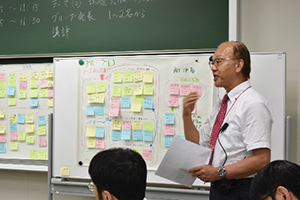
- Keynote speech
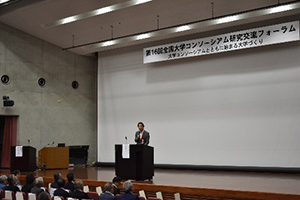
- ▽ Symposium
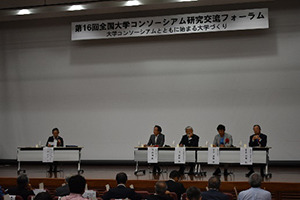
- ▽ Education Administration Report
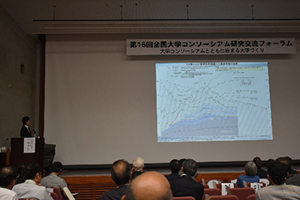
At the symposium that followed, Mr. Takahiro Kai (Representative Secretary of the Kumamoto Association of Corporate Executives), Mr. Taisuke Ono (Deputy Governor of Kumamoto Prefecture), and Mr. Mineo Nakayama (President of Sojo University) engaged in a lively discussion on “University Development Beginning with the University Consortium.”
In the report on education and education that followed, Mr. Hiroki Hirano, Director of the University Reform Promotion Office, University Promotion Division, Higher Education Bureau, Ministry of Education, Culture, Sports, Science and Technology, reported on trends in higher education policy.
In addition, in the poster session held in parallel with the symposium, many questions and comments were asked by the participants about the respective efforts of each consortium organization, and there was a scene where exhibitors and participants actively interacted.
▽Poster session (20 exhibitors)
On the second day, five subcommittees were held on various themes, including “FD and SD Training in University Consortiums,” “Support for Students with Disabilities and the University Consortium,” “Crisis Management and Universities’ Community Contribution: A Case Study of Earthquake Disaster Response,” “What are the activities of the University Consortium that lead to the growth and development of people, universities, and communities?” and “How to develop human resources for regional revitalization.” Practical case reports and exchanges of opinions with participants were held.
▽ Breakout sessions (5 subcommittees in total)
The next 17th forum is scheduled to be held in Osaka in September 2020. Details will be announced on the website of the University Consortium Kyoto as soon as they are decided.
We look forward to your participation.
Inquiries
Secretariat of the National Association of University Consortiums (University Consortium Kyoto)
TEL 075-353-9100 FAX 075-353-9101
〒600-8216 Shimogyo-ku, Kyoto-shi, Nishitoin-dori, Shiokoji, Shimo-ku, Kyoto, Campus Plaza Kyoto
* Reception hours: Tuesday ~ Saturday 9:00 ~ 17:00 (excluding year-end and New Year holidays)














